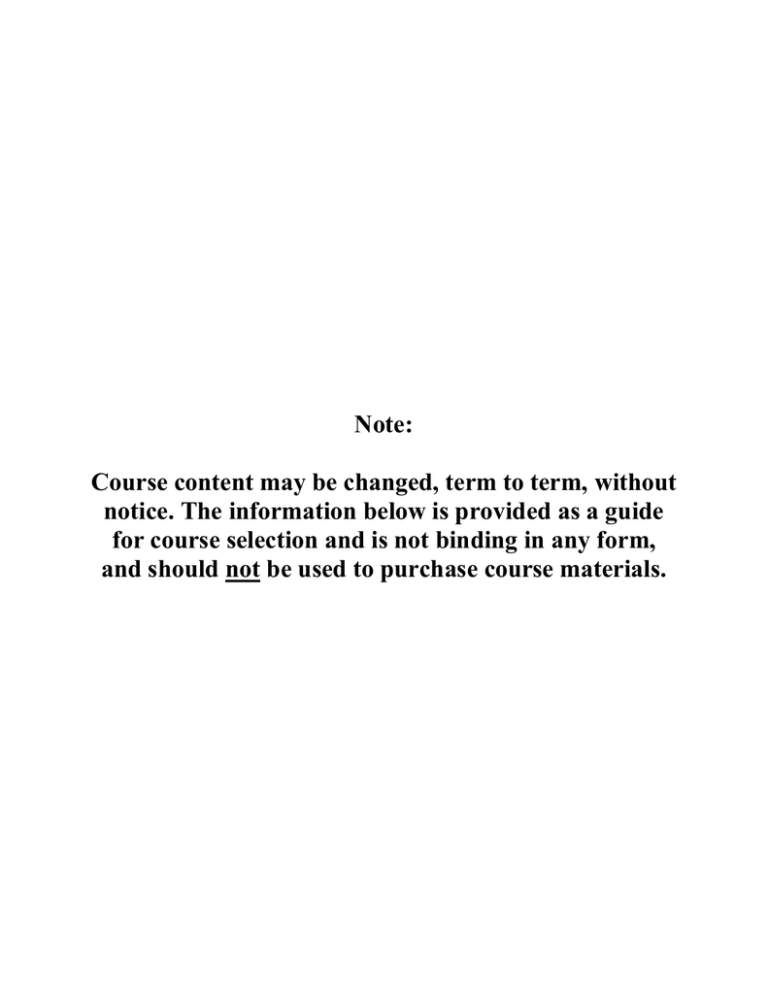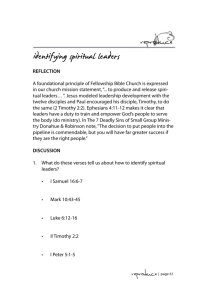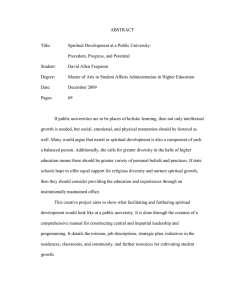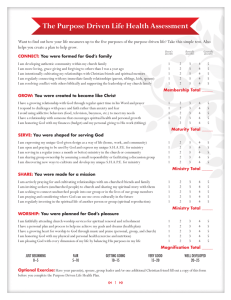Note: Course content may be changed, term to term, without
advertisement

Note: Course content may be changed, term to term, without notice. The information below is provided as a guide for course selection and is not binding in any form, and should not be used to purchase course materials. COMS 542 Syllabus COURSE SYLLABUS COMS 542 COMMUNICATION IN CHRISTIAN MINISTRY COURSE DESCRIPTION This is a practical and theoretical course designed to strengthen communication competencies of students in the Christian ministry environment. Students will interact with and apply basic concepts of communication theory, evangelism, spiritual growth, interpersonal interaction and problem solving, and information through speech giving in the ministry context. RATIONALE In is important that effective communication skills be used in the ministry context. Specific concepts of theory will be applied from communication theory in general, interpersonal communication, small group communiation, listening, language use, nonverbal communication, leadership, public speaking, and organizational communication in the ministry contexts of personal evangelism, small group communication settings, public speaking settings, and work in the ministry based organization. I. II. PREREQUISITES For information regarding prerequisites for this course, please refer to the Academic Course Catalog. REQUIRED RESOURCE PURCHASES Click on the following link to view the required resource(s) for the term in which you are registered: http://bookstore.mbsdirect.net/liberty.htm III. IV. ADDITIONAL MATERIALS FOR LEARNING A. Computer with internet access (broadband recommended) B. Microsoft Word (Microsoft Office is available at a special discount to Liberty University students.) C. Media player software MEASURABLE LEARNING OUTCOMES Upon successful completion of this course, the student will be able to: A. Identify and explain the relationship that exists between effective ministry and effective communication in ministry contexts. B. Evaluate and apply principles of effective communication to his or her personal communication styles in various ministry contexts. Page 1 of 4 COMS 542 Syllabus V. C. Identify where they are spiritually and apply this knowledge to communicating their spiritual journey to others in a dyadic situation. D. Classify effective methods of communication to use when presenting the Gospel of Christ to different people. E. Practice good IPC skills as an interviewer and interviewee in dyadic communication encounters. F. Practice good communication skills as a member and leader in an inductive Bible study. G. Demonstrate use of accepted organizational structures, language use, and nonverbal behaviors in oral communication activities related to ministry contexts. COURSE REQUIREMENTS AND ASSIGNMENTS A. Textbook readings B. Course Requirements Checklist After reading the Syllabus and Student Expectations, the student will complete the related checklist found in Module/Week 1. C. Reflection Papers (4) Students will write four 3-page reflection papers based on the reading assignments. The topics are as follows: Personality-based Evangelism, Falling In Love With God’s word, The Critical Journey, and Preaching That Connects. These papers will be due throughout the duration of the course. D. Inductive Bible Study Preparation Students will select a passage of scripture and prepare notes for an inductive Bible study. This assignment will walk the student through the process of framing scriptural context, analyzing key words, researching other scholarly materials, internalizing the passage, and actualizing scripture in order to change behavior. This assignment is due by the end of Module/Week 2. E. Research Paper Students will write a 10-page paper that addresses the question: How can I reach people for Christ who have a post-modern mindset? Each student will read ten total articles from the D.A. Carson text and use these writings as a base for the discussion in the paper. This assignment is due by the end of Module/Week 3. F. Small Group Assessment For this 6-page paper, students will be reviewing a video-tape of a Bible study. Students will be categorizing communication behaviors, both verbal and nonverbal, and come to conclusions about the role each plays. Goals for improving communication will be developed. This assignment is due by the end of Module/Week 4. G. Peer Interview: Sharing Your Spiritual Journey Page 2 of 4 COMS 542 Syllabus Students will take turns interviewing one other classmate regarding their spiritual journey. The interview will involve answering questions about spiritual experiences and future goals, as well as where the student is currently in his or her spiritual development. The interviewer will compile his or her notes into a 1-page summary for submission. This assignment is due by the end of Module/Week 5. H. Spiritual Growth Evaluation Students will write a 3–5-page analysis which summarizes their personal spiritual journey and includes a reflection on the peer interview. The paper will analyze the student’s level of self-disclosure, comfort zone, and preferred communication techniques. It also requires the student to consider whether or not the peer interview could serve as a tool for spiritual growth and development if converted into a long-term accountability scenario. This assignment is due by the end of Module/Week 5. I. Group Project: A Church In Transition Beginning in Module/Week 3, students will take on the role of member of an ad hoc committee commissioned by the church in order to develop a five year plan in which they address where the church will be in five years. The group will also create a methodology with a time-line on how to get there. Using the Group Discussion Board, the committee will analyze the problem(s) presented, identify solutions, and create a plan for implementing the best answer to the church’s dilemma. By the end of Module/Week 6, one representative will submit a 5-page summary of the group’s ideas and decisions. J. Informative Speech Students will give an 8–10-minute informative speech in front of a small group from church or in front of the congregation. The student will record the speech with a digital video recorder and post it onYouTube for the instructor to view. As a visual aid, students will also create a PowerPoint presentation to accompany the speech. Students will also provide a bibliography that includes at least six sources. This assignment is due by the end of Module/Week 7. K. Persuasive Speech Students will give an 8–10-minute persuasive speech in front of a small group from church or in front of the congregation. The student will record the speech with a digital video recorder and post it onYouTube for the instructor to view. As a visual aid, students will also create a PowerPoint presentation to accompany the speech. The purpose of this speech is to help people recognize a need in the church, community, etc., and persuade a certain course of action within the church to fulfill that need. This assignment is due by the end of Module/Week 8. L. Students will take a Mid-term and Final Exam over selected reading from the Wallace text. The exams will be open-book and open-notes, containing fifty true/false and multiple-choice questions. Students will have 90 minutes to complete each exam. Page 3 of 4 COMS 542 Syllabus VI. COURSE GRADING AND POLICIES A. Points B. Course Requirements Checklist 10 Reflection Papers (4 at 60 each) 240 Inductive Bible Study Preparation 70 Research Paper 100 Small Group Assessment 70 Peer Interview: Sharing Your Spiritual Journey 70 Spiritual Growth Evaluation 50 Group Project: A Church In Transition 60 Informative Speech 100 Persuasive Speech 100 Exams (2 at 70 each) 140 Total 1010 Scale A = 940–1010 A- = 920–939 B+ = 900–919 B = 860–899 B- = 840–859 C+ = 820–839 C = 780–819 C- = 760–779 F = 759 and below C. Late Assignment Policy If the student is unable to complete an assignment on time, then he or she must contact the instructor immediately by email. Assignments that are submitted after the due date without prior approval from the instructor will receive the following deductions: 1. Late assignments submitted within one week of the due date will receive a 10% deduction. 2. Assignments submitted more than one week late will receive a 20% deduction. 3. Assignments submitted two weeks late or after the final date of the class will not be accepted. 4. Late Discussion Board threads or replies will not be accepted. Special circumstances (e.g. death in the family, personal health issues) will be reviewed by the instructor on a case-by-case basis. D. Disability Assistance Students with a documented disability may contact Liberty University Online’s Office of Disability Academic Support (ODAS) at LUOODAS@liberty.edu to make arrangements for academic accommodations. Further information can be found at www.liberty.edu/disabilitysupport. Page 4 of 4 COUR ### Course Schedule COURSE SCHEDULE COMS 542 Textbooks: Carson D.A. Telling the Truth (2003). Ferrin, Keith. Falling in Love with God’s Word (2003). Galli, Mark and Craig Larson. Preaching That Connects (1994). Hagberg, Janet O. and Robert A. Guelich. The Critical Journey (2005). Johnson, Jeffrey A. Got Style? Personality-based Evangelism (2005). Wallace, Samuel P., et al. Communication Principles of Tradition and Change (2009). WEEK/ MODULE READING & STUDY 1 Wallace: chs. 1–3 Johnson: all chapters Carson: parts 1 & 2 (10 essays)* 2 Carson: parts 3–5 Ferrin: all chapters Wallace: ch. 6 3 Carson: parts 6–8 Wallace: chs. 4–5 Poole – Seeker Small Groups 4 Wallace: chs. 9–11 1 presentation 5 Wallace: chs. 7–8 Hagberg: all chapters 6 Wallace: ch. 12 & Appendix ABC 7 Wallace: chs. 13–15 Galli: all chapters 8 Wallace: ch. 16 ASSIGNMENTS POINTS Course Requirements Checklist Class Introductions Reflection Paper 1 10 0 60 Reflection Paper 2 Inductive Bible Study Preparation 60 70 Research Paper 100 Small Group Assessment Midterm (based on Wallace text) 70 70 Reflection Paper 3 Peer Interview: Sharing Your Spiritual Journey Spiritual Growth Evaluation 60 70 50 Group Project: A Church In Transition 60 Reflection Paper 4 Informative Speech 60 100 Persuasive Speech Final Exam (based on Wallace text) 100 70 TOTAL 1010 * Only 10 total essays are to be read either from parts 1 & 2, with at least one essay from each part. NOTE: Each course week begins on Monday morning at 12:00 a.m. (ET) and ends on Sunday night at 11:59 p.m. (ET). The final week ends at 11:59 p.m. (ET) on Friday.




